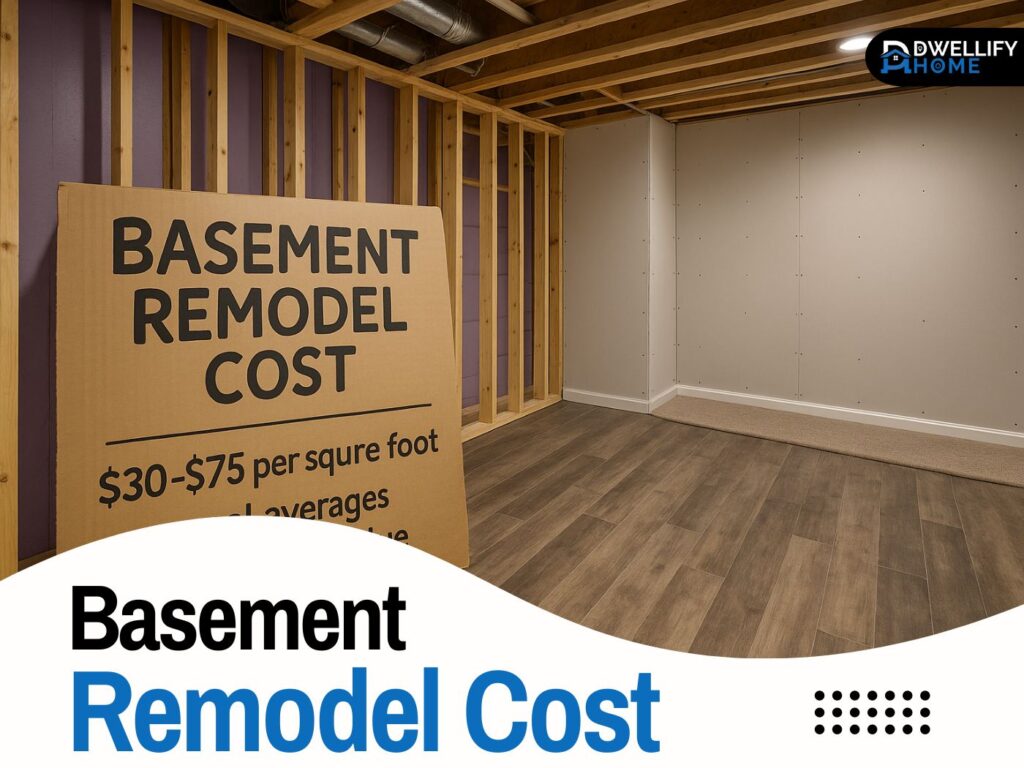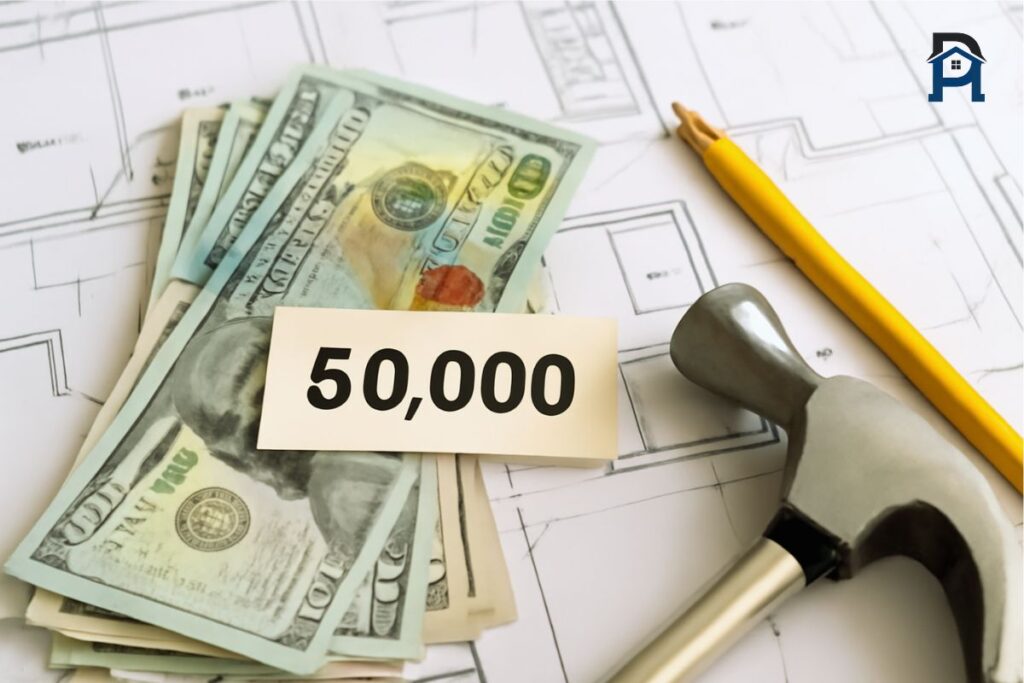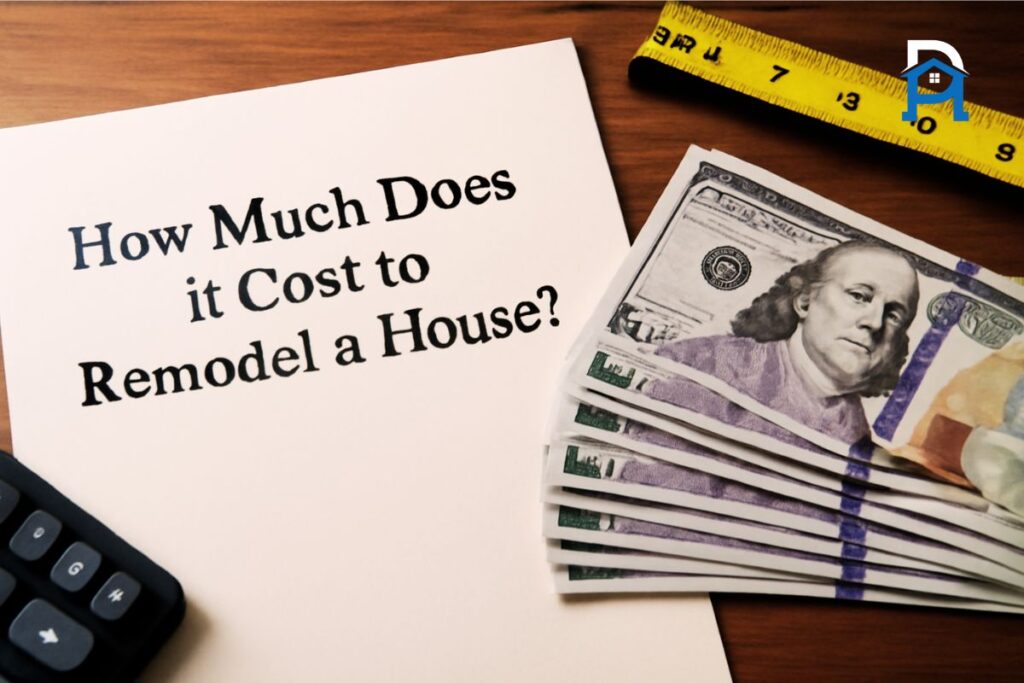When I first looked at basement remodel costs, I was surprised at how much they could vary. On average, the total can be around $22,800, but it really depends on the size, labor, and materials you choose. The cost ranges anywhere from $12,010 on the low side to about $34,548 for a more complete job.
Over the years, I’ve seen many homeowners who had already invested in a finished basement and then realized it was time to consider upgrading with a new remodel. The truth is, basement remodel costs range widely—starting at just $3,250 on the low end but climbing as high as $56,000 on the high end. Most people I’ve worked with usually spend an average of $22,800 when everything balances out.
What makes basement remodeling such a popular home improvement project is not just the look—it’s the value. A good project offers a significant return on investment (ROI), something every homeowner appreciates. From my own experience, a project like this can provide so much: extra living space, a cozy guest suite with a bathroom, a private home gym, or even a full entertainment area where family and friends gather.
For me, guiding people through these numbers is more than just about the cost of basement remodel—it’s about showing them how the right plan can create a meaningful upgrade. And honestly, when I walk into a home where the basement has been transformed, I can feel how much life it adds to the whole house.
Our Mission
At Basement Remodel Cost, our goal is to provide readers with clear, accurate, and trustworthy information to guide their remodeling decisions. Every detail in this article is based on industry expertise, real project data, and fact-checked insights to ensure reliability. We believe homeowners deserve practical advice they can count on, whether it’s understanding costs, planning a project, or choosing the right professionals. By sharing knowledge with honesty and clarity, we aim to help you make confident, informed choices about your basement remodel.
Basement Remodel Cost by Size
It’s unsurprisingly true that a larger basement will always be more expensive to remodel. From what I’ve seen, the average basement remodel cost is usually calculated per square foot, running between $30 and $75. For those who like the finer things, higher-end remodels with luxury features can even creep past $120 per square foot.
I always tell people to think about their basement size first—it really sets the tone for how much they’ll invest. Below is a simple table that breaks down the average cost based on different basement sizes.
| Basement Size | Average Square Footage | Average Cost |
| Small basement | 300–700 | $6,500–$16,200 |
| Medium basement | 700–1,500 | $17,000–$24,000 |
| Large basement | 1,500–2,000 | $21,000–$34,000 |
| Oversized basement | 2,000–4,000 | $30,000–$75,000 |
From my own projects, I’ve noticed that once people move into the medium basement range, they often start adding more custom touches. That’s when the numbers climb, especially with luxury features like a bar, theater, or gym. And honestly, when I walk into a large basement that’s been fully transformed, the investment always feels worth every dollar.
Cost to Hire a General Contractor
From my own journey in home projects, I can say a general contractor is often the smartest professional choice for a large project like a basement remodel. Having one person who can coordinate the entire process makes life much easier. A good contractor has access to trusted pros such as electricians, architects, and plumbers, so you only deal with a single point person instead of chasing multiple workers.
I’ve learned over the years that general contractors charge anywhere between 10% and 25% of the total project cost as their fee. It may feel like a big number, but it saves a lot of stress in the long run. It’s rare to see a general contractor charge hourly, especially for such a large job—most prefer a set percentage, and honestly, that makes budgeting more predictable.
Having worked alongside many contractors, I can tell you the right one not only brings expertise but also peace of mind. When someone professional takes full responsibility for the remodel, the project runs smoother, and you avoid costly mistakes that can happen when managing everything yourself.
Electrician Costs
Whenever I’ve been changing how a basement is used, I almost always had to hire an electrician. From running new wire, setting up lighting, or adding extra outlets, their role is essential. The tasks an electrician handles during a basement remodel often include far more than people realize.
Here’s what the breakdown usually looks like from my experience:
Adding outlets: $100–$450 each
Installing a light switch: $60–$300 each
Adding light fixtures: $150–$900 each
I’ve seen budgets quickly shift depending on how many of these you add. For me, one of the smartest investments is always proper lighting—it completely changes the feel of the basement. And when you bring in a skilled electrician, the job not only looks professional but also keeps everything safe for years to come.
Plumber Costs
I’ve often found that adding a bathroom, kitchenette, or laundry area to a basement makes the space far more practical. But to do it right, you’ll need to hire a plumber. A plumber’s costs can really add up, and they often include essentials that homeowners sometimes overlook.
Here’s what I’ve seen most often in real projects:
Toilet installation: $225–$530
Adding a sink: $215–$660
Installing a shower: $1,100–$8,500
From my own experience, working with a good plumber is worth every penny. A poorly done install can cause leaks and long-term headaches, while the right professional ensures that water runs smoothly and safely. Whether it’s a small area upgrade or a full bathroom, this step is one of the most important parts of a basement remodel.
Additional Pros to Consider Hiring
I’ve learned that depending on the details of your basement remodel, you may need to hire some additional pros to complete the project. It’s not always just about electricians and plumbers—sometimes other experts step in to handle very specific needs.
Here are a few I’ve personally seen make a big difference:
HVAC contractor: $2,000–$3,000
Structural engineer: $70–$250 per hour
Egress window installer: $2,700–$5,900
Bringing in these professionals often saves money in the long run. For example, an HVAC contractor makes sure your basement air stays fresh year-round. A structural engineer can ensure everything stays safe if you’re changing layouts, and an egress window installer is vital if you plan on adding a legal bedroom. These may feel like extra costs at first, but they turn the remodel into a long-lasting upgrade.
Cost to Remodel a Basement by Location
Most basements are underground, and that means location matters more than many people think. The scale of cost to remodel often ties directly to the cost of living (COL) in your area. Some cities add a premium, especially where there are hard-to-access areas like tight basement stairwells in New York City or San Francisco.
I always tell homeowners to remember that the least expensive options are usually in the suburbs, about 30 minutes to two hours from a major city. Go outside that zone and you may face extra surcharges for travel. Plus, basements aren’t common in every city or state, so when there are fewer basements in an area, the quote is often higher.
Your local climate also makes a difference. Depending on how busy contractors are each season, there may be a best time of the year to remodel a basement and save project costs. For example, I’ve noticed late fall is often a sweet spot, since contractors are less booked.
Here’s a quick table that shows how location changes the average cost:
| Location | Average Cost |
| New York, NY | $25,000–$48,000 |
| Los Angeles, CA | $21,000–$36,000 |
| Seattle, WA | $20,500–$34,000 |
| Columbus, OH | $18,000–$24,000 |
| Birmingham, AL | $15,000–$20,000 |
| Indianapolis, IN | $17,000–$22,000 |
From my own projects, I can say the location often surprises people. A basement that costs $20k in one place can easily double in another, all because of market demand, local rules, and even the cost of labor.
Additional Basement Remodel Cost Factors
A basement remodel is never just about putting up drywall or rolling out a beige carpet. It’s often a complicated procedure that involves many cost factors, aspects of construction, and a solid contract to keep everything in check.
From my experience, when you already have a finished basement, the sky can feel like the limit in terms of remodeling possibilities. Depending on your needs and budget, this space can be transformed to match the upper levels of your home. I’ve seen people adding a bathroom, a bedroom, or even creating a wine cellar, home theater, or a gym. Every upgrade brings its own value and makes the basement feel like a true extension of the house.
I always remind homeowners that the cost of remodeling a basement is really only limited by imagination—and of course, the budget.
Here’s a breakdown of what I’ve often seen for popular basement features:
| Feature | Average Cost |
| Bedroom | $3,000–$10,000 |
| Bathroom | $6,600–$16,500 |
| Bar | $800–$22,500 |
| Wine cellar | $5,000–$100,000 |
| Home gym | $300–$15,000 |
| Home theater | $10,000–$60,000 |
| Home office | $1,500–$12,00 |
| Game room | $3,000–$18,000 |
Every project I’ve worked on has been different. One family’s dream home theater was another person’s dream wine cellar. That’s why I always say the basement is the most versatile part of a house—it can become exactly what you want it to be if you plan it right.
Permits and Inspections
One thing I always remind people to budget for is permits. Any basement renovation has its own costs, and the specifics depend on the county or city where you reside. For a typical basement remodel, permits range between $500 and $2,000. Skipping this step can cause delays and even legal issues, so it’s not something to overlook.
When I’ve been working with an experienced company, they usually handle obtaining permits for me. Still, I always make sure to read the details of the contract and verify this important piece. Nothing feels worse than realizing paperwork wasn’t done properly.
From my own experience, the right professional will guide you through the process and make it stress-free. And honestly, knowing all the approvals are in place lets you focus on the fun part—seeing your basement transform.
Framing
The first step that really sets the tone for the remodel is framing. If you’re starting with an unfinished basement, you’ll need to install the walls before anything else can happen. I’ve seen many homeowners spend between $4 and $10 per square foot for this part when done by a professional with proper installation.
From my own projects, this stage feels like a big turning point. Once the walls go up, the basement starts to look like a livable space instead of just storage. It’s one of those investments where you immediately see progress, and it sets the foundation for every upgrade that follows.
Insulation
When working on a basement, proper insulation makes a huge difference in comfort and efficiency. Every home is different, and depending on how much of the basement is protected by the surrounding earth, you might need more or less. I’ve often recommended adding insulation during a basement remodel, since it not only keeps the space warm but also reduces energy bills.
The averages I’ve seen usually fall between $1.50 and $2.50 per square foot. And don’t forget—basement ventilation is just as essential. Poor airflow can cause moisture buildup, so it’s smart to add this into the plan even if it increases the price of insulating a little.
From my own projects, I can say that once a basement is insulated properly, it instantly feels like part of the main house instead of a cold, unused area. It’s one of the best upgrades for long-term comfort.
Drywall
After the framing is complete and the mechanicals are in place, the next big step is putting up drywall. In my experience, this stage is when the basement finally starts looking like a real room instead of a construction site.
The cost usually runs between $1.50 and $3 per square foot, depending on the finish you’re going for. I’ve always found this to be money well spent because smooth walls make every other detail—from paint to trim—look professional.
For me, walking into a basement right after the drywall goes up is one of the most exciting moments of the remodel. It feels like the space is finally coming together.
Flooring
When I talk about basement remodeling, one of the biggest concerns I always highlight is moisture. Choosing the right floor can make or break the whole project. Over the years, I’ve guided homeowners through different flooring choices like vinyl, vinyl laminate, tile, and carpet. Each has its own strengths, but it all depends on how you plan to use the space.
On average, you’ll spend between $3 and $11 per square foot for most basement floors. If you want tiled areas, the range jumps to about $6 to $20 per square foot.
From my own projects, I can tell you that vinyl and laminate are fantastic for handling damp conditions, while tile works great in high-use areas like a bathroom or laundry. And nothing beats carpet if you want the space cozy for kids or a home theater.
Painting
No basement remodeling project ever feels complete until the wall and ceiling are properly protected with a fresh coat of paint. The cost of professional painting depends on how much you want done, but from my experience, it’s worth every dollar for a polished look.
Typically, painting walls, ceilings, and trim work in a basement averages about $4.70 per square foot of finished space. If you’re only focusing on the walls, the price drops closer to $2.75 per square foot.
I’ve personally seen how a good paint job transforms a space. The moment the walls are painted, the basement shifts from feeling like a construction zone to a livable part of the home. It’s that finishing touch that ties the whole remodel together.
Mold Removal
Many basements are prone to water issues, and over time that can lead to serious damage. I’ve walked into projects where simply removing drywall or pulling up flooring revealed hidden mold beginning to grow in the basement. Sometimes it’s just a small amount of non-toxic mold, and in those cases you can often treat it with a DIY mold removal method.
But I’ve also seen situations where moisture problems went deeper. If you need to jack the foundation or fix slab leaks, the costs get much higher. The average cost of foundation repair I’ve come across usually falls between $2,000 and $7,100.
In my experience, catching mold early is key. Whether it’s a quick DIY solution or a bigger structural fix, dealing with it right away saves money and prevents long-term headaches.
Asbestos Removal
One issue that still comes up in older homes is asbestos. It’s a real concern during a remodel, especially if your home was built before the 1980s. Many basement spaces with old vinyl flooring or millboard installed between 1952 and 1982 could have hidden asbestos.
There’s no safe DIY test for it, and if you’re worried, it’s always smarter to hire a local asbestos removal company. Trying to tackle it yourself is risky because even small mishandling can lead to mesothelioma and other asbestos-related conditions.
From what I’ve seen, you should expect to spend an average of $2,100 to remove asbestos safely. It may sound like a big number, but trust me, the peace of mind and safety it brings are worth far more.
Waterproofing
When turning a basement into true living space, keeping moisture out is a top priority. To protect against mold and mildew, I’ve always recommended proper waterproofing methods. Without them, water can slowly infiltrate the area and ruin an otherwise perfect basement remodel.
The average cost of keeping water out usually ranges from $5 to $10 per square foot. From my experience, this is one of the smartest investments you can make. A dry basement doesn’t just add comfort—it also preserves the value of your home long-term.
Every time I’ve seen homeowners skip waterproofing, the regret shows later when they face leaks or mold growth. For me, it’s a non-negotiable step if you want your basement to stay safe and usable.
Foundation Repairs
Sometimes during a remodel, you might notice small cracks developing behind drywall or underneath flooring. For me, this is always a clear sign that the foundation needs attention.
If it’s just minor repairs like a small crack in the floor, it’s usually affordable to fix, often around $500. But bigger issues—like when you have to jack the foundation or fix leaks—can drive the costs much higher. The average cost of foundation repair I’ve seen ranges between $2,000 and $7,100.
In my experience, tackling foundation problems early saves both time and money. Letting them go too long can turn a manageable repair into a massive project that impacts the entire basement remodel.
DIY vs. Hiring a Pro to Remodel a Basement
The cost of basement remodeling depends on many factors. If you already have a finished basement, sometimes adding minor finishes or small upgrades can be a good way to save money on labor by doing it yourself. But when someone is inexperienced, or running short on time and lacking proper tools, tackling everything alone can quickly become overwhelming.
That’s where hiring a basement remodeling contractor makes a difference. A general contractor will handle the whole project—from planning, ordering materials, and scheduling deliveries to the final installation. Instead of managing different trades one by one, you get a smoother workflow with one person responsible for the work.
Of course, there are general contractor costs to consider. They usually charge 10% to 25% of the total basement remodel cost. For example, if your project costs around $40,000, the contractor fee could land between $4,000 and $10,000. While that feels like a lot, the time, expertise, and energy you save often outweigh the expense.
In the end, it comes down to choice. Doing it yourself might feel satisfying, but working with a professional often proves to be worth the money—especially when avoiding mistakes that could cost even more later.
Remodeling vs. Renovating a Basement
For many homeowners, deciding between a full remodel or a renovation comes down to scope. A total overhaul is often the choice when there’s unforeseen damage or the goal is to completely change the basement. This may involve removing elements, making large changes to the room, and even adding walls or a bathroom. It’s definitely the more expensive option, but it can fully transform the space.
On the other hand, a renovation is a lower-cost option that still delivers a large impact—often more visual than structural. A renovation may include painting, changing flooring, or removing drywall in certain sections. These kinds of basement renovations are often the right choice for homeowners who want to spruce up the space without diving into major construction.
Both approaches have their place—it simply depends on budget, goals, and how much change you want to see in your basement.
How to Save Money on Basement Remodeling Costs
The cost of finishing a basement is a big investment, but when done right, a finished basement can add value to your home. The smart approach is to save money where you can and still keep quality high. With the right budget planning, your basement remodeling costs can be managed in a way that helps you truly maximize the investment.
Here are strategies I’ve seen work time and again:
- Obtain three price estimate bids for your project from different contractors. Always avoid choosing a company that offers discounted pricing if the deal likely appears too good to be true.
- Balance finish and fixtures between basic and luxurious, depending on what your budget allows.
- Perform preparation work such as demolition yourself to cut down on labor fees.
- Take on smaller jobs—DIY finish trim work and painting are both possible ways to save.
- Work with a designer who can plan around existing plumbing and electrical to minimize costs.
- Skip full builds around mechanicals—finishing space near the furnace and water heater can be wasteful. Simply add a wall, account for adequate access, and move on.
- Get creative at a recycled building materials store, incorporating reused or bargain materials into the design.
These steps don’t just save money—they make the remodel feel smarter and more intentional. With thoughtful planning, you can enjoy the benefits of a finished basement without overspending.
Does Remodeling a Basement Increase Home Value?
A basement remodeling project not only changes how the space feels but also offers a return on investment (ROI) that makes it a truly worthwhile project. With an average 70% ROI, it’s one of the strongest home upgrades you can make. Beyond numbers, a remodeled basement gives you extra space to work, play, or even welcome guests, creating a more relaxed home environment. For potential buyers, this becomes an attractive aspect of a home, and the value is clearly reflected in the resale.
For families with young children or kids away at college, having a separate space that feels detached from the main house is priceless. It’s no surprise that a 70% ROI is counted among the highest returns for any home improvement project. Not only does it increase buyers’ interest, but it may also help you collect multiple quotes when you decide on a house sale, turning your property into a real seller’s market gem.
In the end, the benefits of remodeling extend beyond just living comfort—they directly impact long-term financial gain. A basement that’s been thoughtfully upgraded becomes one of the most desirable features in today’s housing market.
Frequently Asked Questions
How long does a basement remodel take?
When assuming a full remodel for an average-sized basement, the timeline depends heavily on hiring a reputable contractor. On average, the process can take about two weeks, though larger basements or more complex designs may stretch longer.
One of the challenges I’ve seen is dealing with stairs and difficult access. Unlike working in an entryway, basements require extra effort with the shuttling of materials. Everything has to be carefully moved in and removed through a doorway, which adds to delays.
Add in the need for proper ventilation, safety precautions, and unexpected hurdles, and it’s natural for both time and cost to increase. While some projects move fast, it’s always smart to plan for extra days, just in case.
How do I budget for a basement remodel?
The average cost of remodeling a basement usually falls between $30 and $75 per square foot. That means the total can vary a lot depending on the space. If the area is unfinished and needs extra help, it’s always safer to use the higher number when calculating estimated basement remodeling costs.
A good rule of thumb I follow is to add an additional 20% on top of your estimate. This cushion helps cover situations that pop up unexpectedly—like hidden water damage, code changes, or design tweaks.
Planning ahead with this approach keeps the remodel less stressful and ensures you won’t run out of funds before the project is complete.
Who do I hire for a basement remodel?
For most basement remodels, the best decision is to hire a general contractor. There are plenty of reasons why—general contractors come with dedicated teams they already trust and feel comfortable working with. Instead of hiring multiple people and trying to deal with every individual pro, you get one person managing the entire project.
Another benefit is the way costs are handled. A contractor can give you a single quote, often by lumping work and subcontracting together into one smooth plan. This way, you don’t juggle separate bills for plumbing, electrical, or carpentry—it all comes as a single quote.
This approach saves time, reduces stress, and ensures the remodel stays on track from start to finish.
What usually costs the most when finishing a basement?
The highest expense in finishing a basement often comes from labor costs, especially for plumbing and electrical installations. Bringing in licensed professionals is not cheap, but it’s essential. These experts make sure everything is safe, up to code, and built to last. While it adds a big chunk to the budget, skipping on this part can lead to even more costly problems down the road.
Disclaimer
The insights I’ve shared on Basement Remodel Cost come from my own experience and knowledge in this field, but they are meant for general information only. This content is not a substitute for professional, financial, legal, or construction advice. Every basement project is different, and actual costs, results, and situations can vary widely. For decisions specific to your home, always seek guidance from a qualified remodeling or construction professional.

I’m Bilal, the founder of Dwellify Home. With 6 years of practical experience in home remodeling, interior design, and décor consulting, I help people transform their spaces with simple, effective, and affordable ideas. I specialize in offering real-world tips, step-by-step guides, and product recommendations that make home improvement easier and more enjoyable. My mission is to empower homeowners and renters to create functional, beautiful spaces—one thoughtful update at a time.




